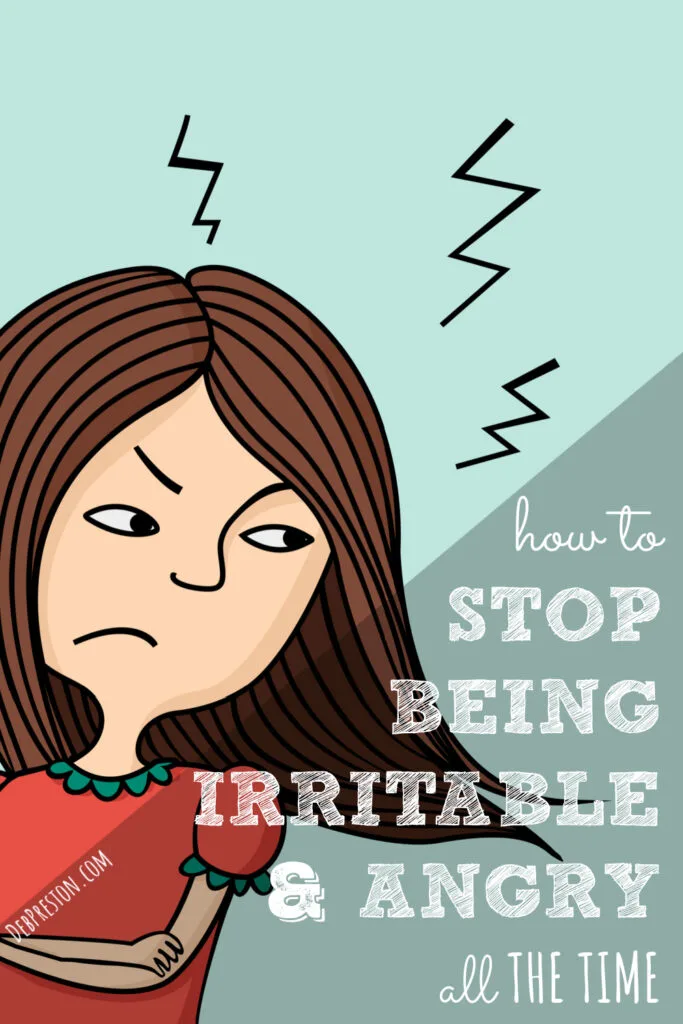Most of the time, I’m a patient and loving wife, mother, and friend. I assume the best of everyone and everything, show others grace, and choose to let things go.
But sometimes…I’m just irritable!
Once in a while, I know exactly why I’m feeling irritable but the rest of the time…it’s really anyone’s guess!
Something rubbed me the wrong way and for whatever reason, it was the straw that broke the camel’s back. Then I’m stuck there and miserable and making everyone else around me miserable too.
Recently, it occurred to me that I should probably research how to stop being irritable. I mean, why suffer unnecessarily, right? And what I learned almost immediately changed my life for the better!
Want to know the secret to how to stop being irritable, both in the moment and in general? I’ve got you!

Recognizing the Signs of Irritability
To learn to manage irritability, you first need to recognize its signs. It often starts subtly, but identifying it early can prevent escalation.
Understanding Emotional State
Recognizing when you’re experiencing feelings of irritability is a crucial first step.
It’s that sensation where minor frustrations can suddenly feel overwhelming. You might notice a series of negative emotions bubble up, such as impatience or annoyance, toward situations or people that wouldn’t usually bother you.
Identifying Irritable Moods
An irritable mood can transform into uncontrolled anger or a short temper.
Look out for signs like:
- Angry outbursts in response to small annoyances
- A pervasive bad mood that doesn’t seem to have a particular trigger
- A tendency to react hastily and more harshly than intended
By noticing these changes in your mood and reactions, you’ll be in a better position to address irritability before it affects your interactions and well-being.
Identifying Potential Triggers
To effectively manage irritability, it’s vital to recognize what sparks it.
From the dynamics at home to the pressures of work, various factors can contribute to this emotional state. Examining dietary habits can also shed light on why you might be feeling more irritable.
Family and Social Interactions
Interactions with family members can sometimes be a source of stress, leading to irritability.
Small misunderstandings or continuous demands by relatives might weigh on your emotional well-being. Pay attention to whether specific topics or types of conversations with loved ones usually precede feelings of irritability.
Workplace and Daily Life Stressors
Daily life and workplace pressures often become stressful situations that trigger irritability. Deadlines, work politics, or an overwhelming workload can increase your stress levels.
Take note of when your irritability surfaces. Is it during traffic jams, after back-to-back meetings, or perhaps when juggling too many tasks at once?
Diet and Blood Sugar Levels
Your diet plays a crucial role in managing moods.
Consuming too much caffeine or not eating regular meals can cause low blood sugar levels, which might manifest as irritability. Be mindful of your caffeine intake and try to keep your blood sugar stable by eating balanced meals throughout the day.
Understanding the Role of Physical Health
Your body’s physical health also plays a significant role in mood regulation, and imbalances or disruptions in this area can contribute to feelings of irritability. Paying attention to sleep and activity levels can help mitigate irritability.
Sleep Patterns and Disorders
Maintaining regular sleep patterns is crucial for your emotional well-being. Adults typically need between 7 to 9 hours of sleep each night.
Disruptions in these patterns, such as those caused by sleep apnea, can lead to irritability. Sleep apnea, a condition where breathing stops intermittently during sleep, leads to poor sleep quality and can significantly affect your mood the following day.
Physical Activity and Hormones
Regular physical activity contributes to the release of endorphins, which are often referred to as ‘feel-good’ hormones. These natural mood lifters help decrease levels of the stress hormone cortisol, which when elevated, can contribute to hormonal imbalance and irritability.
Aim for at least 30 minutes of moderate exercise most days of the week to help maintain hormonal balance and manage stress.
Exploring Psychological Factors
Understanding the psychological factors behind irritability can help you address the root causes effectively. Mood disorders and anxiety can significantly influence your emotional state, potentially leading to increased irritability.
Mental Health and Mood Disorders
Mood disorders, such as bipolar disorder and premenstrual dysphoric disorder (PMDD), are often characterized by significant fluctuations in your mood that affect how you feel, think, and handle daily activities.
For instance, if you’re experiencing bipolar disorder, your irritable moments might be a part of the manic or depressive episodes. Similarly, PMDD can cause severe irritability in the days leading up to your menstrual cycle.
- Bipolar Disorder: Consists of periods of depression and periods of mania or hypomania.
- Premenstrual Dysphoric Disorder: Affects your mood and behavior before menstruation.
Addressing any underlying mental health issues with a professional can lead to a personalized strategy to manage these fluctuations and reduce irritability.
Coping with Anxiety and Panic
Anxiety disorders can cause you to respond to situations with a heightened sense of unease, often translating into irritability. Learning to cope with anxiety and panic attacks involves recognizing triggers and practicing techniques that can provide relief.
- Anxiety Disorder: May cause continual nervousness, fear, or excessive worry
- Panic Attacks: Sudden, intense surges of fear or discomfort, often with physical symptoms
Methods such as deep breathing exercises, mindfulness, and therapy can offer effective ways to quell anxiety-induced irritability. If symptoms persist, seeking guidance from a mental health professional is a crucial step toward reclaiming your calm.

Making Lifestyle Adjustments
To combat irritability, you can make targeted lifestyle changes that directly impact your mood and stress levels. Implementing regular stress management techniques and adjusting your diet and activity routines are key steps in addressing chronic irritability.
Stress Management Techniques
Managing stress is essential for lessening irritability, especially when you’re frequently in stressful situations. Techniques like deep breathing exercises can be immensely calming.
A simple strategy is to breathe in slowly for a count of three, hold for another three seconds, and then exhale for three seconds. Repeat this several times when you feel your stress levels rising.
Additionally, ensure that you engage in activities on a regular basis that promote relaxation, like yoga or meditation. These practices can help you develop resilience against the pressures of daily life.
Diet and Activity Routines
What you eat and how much you move can affect your mood on a regular basis. Adopting a balanced diet that minimizes high sugar and caffeine intake can stabilize your energy and mood.
Regular physical exercise can also serve as an effective outlet for stress relief. This doesn’t necessarily mean hitting the gym every day; it can be as simple as taking daily walks or incorporating stretching sessions into your routine.
Regular activity helps release endorphins, which are natural stress fighters, and supports overall well-being.

Establishing Long-Term Coping Strategies
To effectively combat irritability, you’ll need strategies that address the root causes and can be consistently applied over time. Think of these strategies as an investment in your future peace of mind, allowing you to better manage those little things that might otherwise set you off.
Building Support Networks
Building a strong support network is a vital long-term strategy for managing irritability.
This network can include trusted family members, friends, or professional counselors. They can provide you with different ways to vent frustrations and seek guidance.
For example:
- Family Members: Engage in regular catch-ups to share concerns and receive support.
- Friends: Sometimes, getting an outside perspective can help you see situations differently.
- Professional Help: If irritability is stemming from a deeper issue, therapists can assist in uncovering and tackling the root cause.
Monitoring Progress Over Time
To ensure these strategies are working for you, monitoring your progress is essential.
Keep a journal or use apps to record instances of irritability and note what triggered them. Over time, patterns may emerge showing improvement or areas that need further work.
Seeing tangible evidence of your progress can be incredibly motivating and help you adjust your strategies for the better next time.
Examples of tracking include:
- Keeping a Journal: Write down when you feel irritable and what might have caused it.
- Reflect And Learn: Regular reflection can help you recognize triggers and plan coping mechanisms for similar future situations.
Creating a Personalized Treatment Plan
Creating a treatment plan that’s tailored to your unique needs is a vital step toward managing irritability. With the help of a mental health professional, you can explore various treatment options and craft a strategy that effectively addresses your specific challenges.
Consulting a Mental Health Professional
To start building your treatment plan, seek out a mental health professional who can assess any underlying medical conditions and guide you through the process.
They will likely work in a private practice or healthcare setting and can provide a comprehensive evaluation to understand the depth of your concerns. This professional will be instrumental in identifying contributing factors to your irritability and recommending appropriate treatment options.
Considering Treatment Options
After consulting with the professional, you’ll explore a variety of treatment options together. These may include therapy, medication, lifestyle changes, or a combination thereof.
It’s important to consider all suggested methods. You’ll also want to be open about any preferences or concerns you might have.
Together with your mental health professional, you’ll construct a treatment plan. This plan is specifically tailored to align with your personal health goals and to address your unique situational factors.

While it’s not easy to learn how to stop being irritable, the road is well worth traveling. From addressing our physical and mental health to adjusting our lifestyles, we have a lot of different options for getting there.
Whatever path to recovery you choose, I’m rooting for you! We’ve got this!

P.S. Ready to escape survival mode? To take control and start living life on YOUR terms? The Take Charge Collection of 15 free resources will help you to simplify, organize, and take charge of your life! Get yours HERE.
Disclosure: While all opinions are our own, we are a participant in the Amazon Services LLC Associates Program and other affiliate advertising programs, designed to provide a means for us to earn fees by linking to Amazon.com and affiliated sites, at no additional cost to you.



